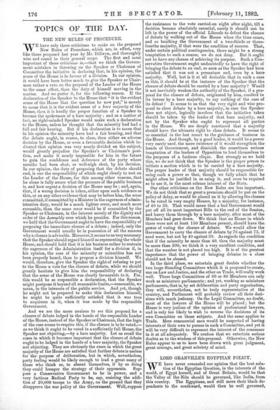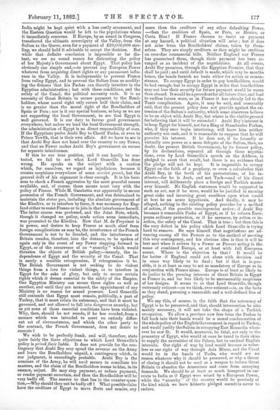LORD GRANVILLE'S EGYPTIAN POLICY.
WE have never concealed our opinion that the best solu- tion of the Egyptian Question, in the interests of the world, of Egypt herself, and of Great Britain, would be that the Valley of the Nile should be governed, like India, from this country. The Egyptians, and still more their black de- pendants to the southward, would then be well governed, India might be kept quiet with a less costly armament., and the Eastern Question would be left to the populations whom it immediately concerns. If Europe, by an award in Congress, transferred the ultimate sovereignty of the Valley, from the Sultan to the Queen, even for a payment of £20,000,000 ster- ling, we should hold it advisable to accept the decision. But while that definite conclusion is impossible or far dis- tant, we see no sound reason for distrusting the policy of her Majesty's Government about Egypt. That policy has obviously one simple end,—to prevent any European Power whatever from acquiring direct rights or any paramount influ- ence in the Valley. It is indispensable to prevent France from ruling Egypt, and to prevent the Sultan from so modify- ing the firmans that his Pashas can directly interfere in the Egyptian administration ; but with these conditions, and the safety of the Canal, the political necessity ends. It is no necessity of Great Britain to secure payment to the Bond- holders, whose moral right only covers half their claim, and is no greater than the moral right of the Bondholders of Spain or Peru ; nor is it our special business, so long as we are not supporting the local Government, to see that Egypt is well governed. It is our duty to favour good government everywhere, but unless we lend the local Government strength, the administration of Egypt is no direct responsibility of ours. If the Egyptians prefer Arabi Bey to Cherif Pasha, or even to Prince Tewfik, that is their own affair. All we have to see is that Arabi Bey does not hand over the country to any Power, and that no Power makes Arabi Bey's government an excuse for separate interference.
If this be our true position, and it can hardly be con- tested, we fail to see what Lord Granville has done wrong. He speaks on the subject with a caution which, for ourselves, we regard as injudicious, because it creates suspicions everywhere of some arriere pense'e, but the general drift of his argument is clear enough. It is his busi- ness to check a French aggression by the most peaceful means available, and, of course, those means must vary with the policy of France. While M. Gambetta was apparently in secure possession of the French Government, and was determined to maintain the status quo, including the absolute government of the Khedive, or to interfere by force, it was necessary for Eng- land either to resist France or to join in that interference herself. The latter course was preferred, and the Joint Note, which, though it changed no policy, made action seem immediate, was presented to the Khedive. Now that M. de Freycinet is in power, and desires to keep France as much aloof from foreign complications as may be, the interference of the French Government is not to be dreaded, and the interference of Britain recedes, therefore, into the distance, to be spoken of again only in the event of any Power stepping forward in Egypt, or of the occurrence of an " anarchy " which would threaten the objects of British policy,—namely, the in- dependence of Egypt and the security of the Canal. That is surely a sensible retrogression, if retrogression it be.
The British Government is not seeking to do violent things from a love for violent things, or to interfere in Egypt for the sake of glory, but only to secure certain rights which it deems essential to the safety of the Empire. One Egyptian Ministry can secure those rights as well as another, and until they are menaced, the appointment of any Ministry is no reason for armed pressure. Lord Granville still contends that Egypt must remain, politically, a part of Turkey, that it must retain its autonomy, and that it must be governed, and not allowed to fall into dangerous anarchy, but as yet none of those essential conditions have been violated.
Why, then, should he not recede, if he has receded, from a menace which was intended to meet an entirely differ- ent set of circumstances, and which the other party to the contract, the French Government, does not desire to execute ?
We wish to be perfectly frank, and will, therefore, state quite fairly the three objections to which Lord Granville's policy is primd facie liable. It does not provide for the con- tingency that Arabi Bey may spend the revenue on the Army and leave the Bondholders unpaid, a contingency which, in our judgment, is exceedingly probable. Arabi Bey is the nominee of the Army, he will need money to conciliate his masters, and the claim of the Bondholders seems to him, in its essence, unjust. He may stop payment, or reduce payment, or render payment uncertain, and then the Bondholders will be very badly off. The answer to that lies in the counter-ques- tion,—Why should they not be badly off ? What possible claim have the creditors of Egypt to move fleets and armies, any more than the creditors of any other defaulting Power, —than the creditors of Spain, or Peru, or Mexico, or Costa Rica? If France chooses to insist on payment at any hazard, a political situation will arise ; but it does not arise from the Bondholders' claims, taken by them- selves. They are simply creditors, as they might be creditors on over-due commercial bills. Neither England nor France has guaranteed them, though their payment has been ar- ranged as an incident of the negotiations. At all events, Arabi Bey promises, through the Egyptian Premier, that they shall be paid ; and until default is made, which may be months hence, the bonds furnish no basis either for action or remon- strance. To occupy Egypt in order to pay bondholders, would be bad enough, but to occupy Egypt in order that bondholders may not lose their security for future payment would be worse than absurd. It would be a precedent for all future time, and lead to endless future wars, as in France it has already led to the Tunis complication. Again, it may be said, and reasonably said, that the present policy does not provide against the ex- tension of the Sultan's authority, which some observers believe to be an object with Arabi Bey, but where is the visible ground for believing that it will be extended ? Arabi Bey's interest is to keep Egypt for himself, not for a Ring of Stamboulee Pashas, who, if they once begin interfering, will leave him neither authority nor cash, and it is reasonable to suppose that he will perceive his interest. If he does not, if he formally or virtually uses power as a mere delegate of the Sultan, then no doubt, the present British Government, by its former policy, by its declarations, repeated all through these negotia- tions, even by Lord Granville's speech on the Address, is pledged to avert that result, but there is no evidence that
the pledge will not be kept. It is impossible to occupy Egypt on the faith of a prophecy, or even a calculation that Arabi Bey, in the teeth of his protestations, of his in- stincts—for he is Arab, and not Turk—and of his direct interest, will deliberately place a foreign and Turkish master over himself. No English statesman would be supported in such an act, nor if he were, would he be justified in running great risks and incurring great sacrifices upon what would at best be an acute hypothesis. And finally, it may be alleged, nothing in the existing policy provides for a method of action, if the possible contingencies arrive ; if Arabi Bey becomes a removable Pasha of Egypt, or if he refuses Euro- peans ordinary protection, or if he menaces, by action or in- action, the safety of the Canal. That is true ; but then this is the very defect in his policy which Lord Granville is trying hard to remove. He says himself that negotiations are ad- vancing among all the Powers as to the method of meeting this very contingency, and his obvious idea is that it will be best met when it arrives by a Power or Powers acting in the name of combined Europe, or at least with full European
assent. Where is the objection to that It would be far better if England could act alone with decision. and in some way likely to be final ; but if that is impos- sible, it is at least as easy to act as mandatory of Europe as in conjunction with France alone. Europe is at least as likely to do justice to the pressing interests of Great Britain in Egypt as France is, and far less likely to be unreasonably suspicious of her designs. It seems to us that Lord Granville, though extremely reticent—as we think, over-reticent—is, on the facts as they stand, pursuing a reasonable and a well-defined line of policy.
We say this, of course, in the faith that the autonomy of Egypt is to be preserved, and that, should intervention be ulti- mately necessary, it will not take the shape of a Turkish occupation. To allow a province now free from the Pashas to fall back into their hands would be a moral condemnation of the wholepolicy of the English Government in regard to Turkey, and would justify the Sultan in occupying East Roumelia when- ever he saw fit. It would, moreover, be fatal, not only to the peasantry of Egypt, who would at once be taxed to their skins to supply the necessities of the Palace, but to cardinal English interests. Our right of way by land would become as value- less as our right of way through Asia Minor, and the Canal would be in the hands of Turks, who would see no reason whatever why it should be preserved, or why a threat of closing it should not be used as a weapon to induce Great Britain to abandon the Armenians and cease from annoying demands. We should be at least as much hampered in our route to India as if Egypt were seized by a European Power, while the " anarchy ' of the country would be precisely of the kind which we have hitherto pledged ourselves never to endure.















































 Previous page
Previous page